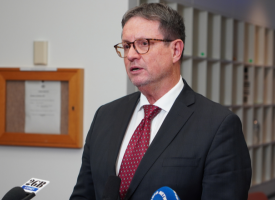Funding support overdue for Tasmania's prison mental health services
Dr John Saul, AMA Tasmania President, today supported Coroner Webster's findings on the underfunding of Tasmania's prison mental health services, adding, "It's time for urgent action to ensure Risdon Prison meets its international obligations under the Nelson Mandela Rules."

"Robert Harold Gerard's tragic case underscores the consequences of neglecting mental health services in our prisons.
"Prison mental health services have long been underfunded, leading to a demoralised prison health workforce as staff struggle to ensure the safety of their patients who need care.
"Tasmania must prioritise inmate mental health and well-being with increased funding and staffing."
AMA Tasmania's 2024 state government budget submission echoes Coroner Webster's concerns, demanding immediate action to rectify the dire state of prison mental health services.
"Failure to act compromises both safety and human dignity.
"Currently, the prison has less than a quarter of the recommended staffing for the prison population they cover, noting the prison population has swelled to almost 800 people.
"The service has only three staff on any given day, while an approved business case for 14 FTE sits unfunded.”
AMA Tasmania calls upon the government to immediately fund a minimum of 14 FTE as proposed in our budget submission, noting the Ogloff Review in 2020 recommended 25 FTE.
"Tasmania's prisons face a crisis of mental health care, and the government must allocate resources to meet the minimum staffing requirements."
Dr Saul said that at the time of writing our 2024/25 budget submission, the service operated on 0.8 of a psychiatrist, three nurses and a 0.4 registrar. The Registrar position would not continue this year, thereby halving the medical cover for the prison.
"The only positions funded as part of the prison mental health service are the psychiatrist and one nursing position.
"Staff working in the service are at risk of burnout due to stress and moral injury, that is, burnout caused by witnessing adverse patient outcomes due to a lack of resources.
"This must become a priority of government to fix." >>> ENDS



